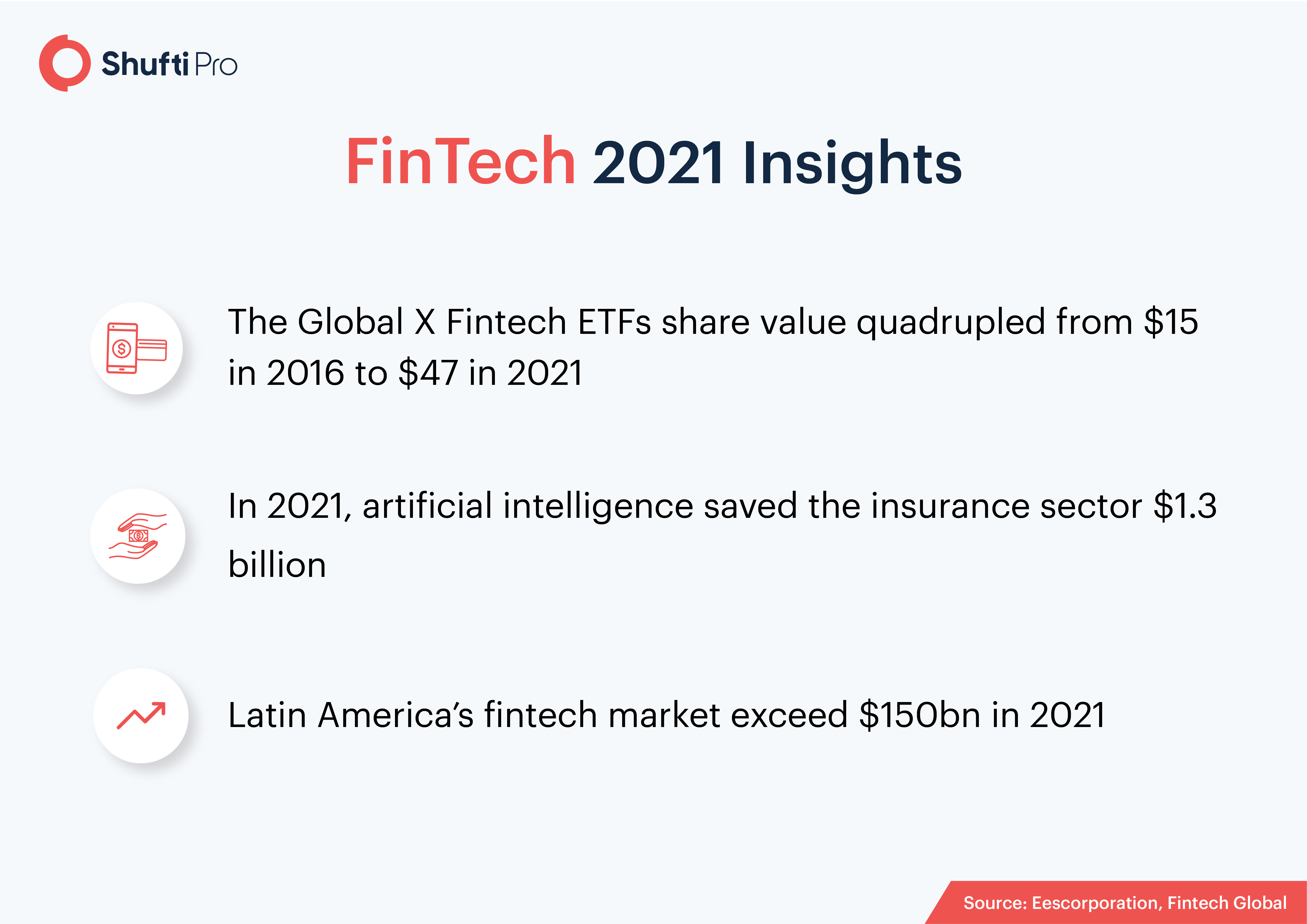A Year In Review of the FinTech Industry [2021 Update]

The FinTech industry is soaring with a record of $91.5 billion in global funding so far this year, almost twice in number as compared to 2020. Increasing demand for online payments, investments in tech-driven solutions, supportive global regulations, and the need for the internet of things (IoT) devices are accounted for by this positive influence on the global FinTech sector.
Emerging innovations like digital currencies, paperless lending, online mobile wallets, and rapid adoption of e-commerce businesses across the world have paved the way for growing FinTech transactions. Yet, rising concerns of data privacy, security, and insufficient technology expertise are making barriers for this industry. Due to this, the FinTech industry also has to comply with global regulations like Anti-Money Laundering (AML), Counter-Terrorism Financing (CTF), and various others. Compliance standards differ from region to region but have the same objective – to detect and eliminate the risk of financial crimes.
Coronavirus Crisis and FinTech
As the coronavirus pandemic continues to create uncertainty, FinTech firms are also under stress. Particularly, the startup companies were challenged as global investors mainly focused on well-developed FinTechs with top-notch business models. Additionally, due to the decreased interest rates and economic slowdown, the industrial assumptions have significantly changed. As the international economy is on the road to recovery, many new challenges and opportunities have emerged for FinTech companies.
“Fintech has shown its potential to close gaps in the delivery of financial services to households and firms in emerging markets and developing economies,” said World Bank Global Director for Finance, Competitiveness, and Innovation.
According to various studies and surveys, the fintech sector is adapting to the pandemic situation and is offering innovative ways for regulatory authorities and lawmakers that are seeking to promote digitization.
“The global FinTech industry has been largely resilient in spite of COVID-19. Nonetheless, its growth must be interpreted with nuance and in the context of unevenness, and the opportunities for the industry should be juxtaposed with the challenges it faces,” says Co-Founder and Executive Director of the Cambridge Centre for Alternative Finance.
It is crystal clear that Covid has badly affected the world’s economy with long-lasting impacts for businesses and individuals. Despite challenges, the fintech sector has proven resilient and adaptable; contributing to relief programs, normalizing operations, and assisting market segments like SMEs.
However, FinTech companies have also reported some funding and operational challenges. Many of the businesses stated that they had to change their models, including reducing their fees, re-defining qualifications criteria, and easing the payment requirements. Other than this, they also introduced improved fraud detection measures to counter surging criminal crimes. Further, these companies also experienced an increase in expense for data storage and client onboarding.

FinTech Crimes Becoming Global Concern
Fraud rate within FinTech companies continues to increase despite heavy investments being made in cybersecurity and scam prevention tools. Every day, new scam schemes emerge and criminals show no signs of slowing down their efforts to come up with sophisticated ways to exploit security measures.
However, there has been a significant increase in identity verification fraud across the fintech sectors. In the first half of 2021, the fraud rate spiked 15% compared to 2020. However, fraud levels across all types of industries increased by 7%, but no sector is more vulnerable than the Fintech Industry.
Unfortunately, there were heaps of positive strides in making the digital landscape secure, including various regulations, yet criminal activists have identified sophisticated methods to manipulate security systems and to get access to individuals’ personally identifiable information that can be utilized to defraud them for financial gains. Social engineering attacks were carried out at large, as fraudsters exploit and groom victims into disclosing their financial details or transferring funds, contributing as a crucial driver for authorized and unauthorized fraud losses in the first half of 2021. It’s not enough to match fraudster progress, FinTech companies have to stay one step ahead with their online identity verification systems to protect businesses and their clients.
Let’s face it – conventional verification techniques like OTP or single authentication are no longer fruitful to counter tech-driven fraudulent activities. However, robust solutions like facial biometric recognition are the best way of protecting accounts. Emerging technologies like AI and ML can also be incorporated in ID verification solutions to determine the authenticity of clients, this can assist businesses to trace criminals impersonating real individuals.
Global-Regulation for FinTech
Scrutiny of the FinTech industry continues to escalate. Global regulatory bodies are addressing the concerns over data usage, digital privacy, content moderation, and other issues that are becoming a source of digressing for businesses. The aim of laws and standards is to secure FinTech’s operations and services.
Denmark
The Danish Financial Services Authority (FSA) has come up with a fintech task force having objectives to ensure that fintech initiatives receive suitable guidance as to the type of license, if any, necessary to carry out their contemplated business. The FSA is also considering the potential introduction of a regulatory sandbox inspired by the UK and Singapore models.
Germany
The Federal Financial Supervisory Authority (BaFin) has provided regulatory standards and policies for FinTech companies and has also developed an internal task force. The regulatory authority conducts seminars on fintech and has expressed thoughts on it. Yet has not developed any initiatives to ease regulatory compliance for FinTech businesses and has made clear that companies are expected to meet legal requirements. Therefore, if the companies require financial services or banking licenses, the same laws will be applied as for any other financial sector entity.
Italy
The Italian government has adopted legislation to promote innovative entrepreneurship, primarily applying to fintech. These businesses having a goal of developing and selling technology-driven products would have to meet regulatory standards. While such laws don’t impact licensing requirements, it does provide a number of incentives for the standard company law framework, including a simplified process for Fintech companies to access the country’s State Guarantee Fund for SMEs. Other than this, the Bank of Italy has also held seminars and meetings with a number of regulatory bodies to discuss Fintech, with themes including trends, risks, and future opportunities.
Final Thoughts
Cautiousness is paramount for the FinTech sector when it comes to determining and deterring fraudulent activities. To make fintech companies immune to fraudulent attacks, businesses need to determine their shortcomings and innovate robust identification systems.
Shufti’s state-of-the-art identity verification solution with thousands of AI models that can identify real identities and also check backgrounds in less than a seconds along with 98.67% accurate results. Companies can onboard legit clients only, stay put with regulatory obligations, and keep secure from hefty fines.
To know more about ID verification for FinTech sector, talk to our experts right away!

 Explore Now
Explore Now













